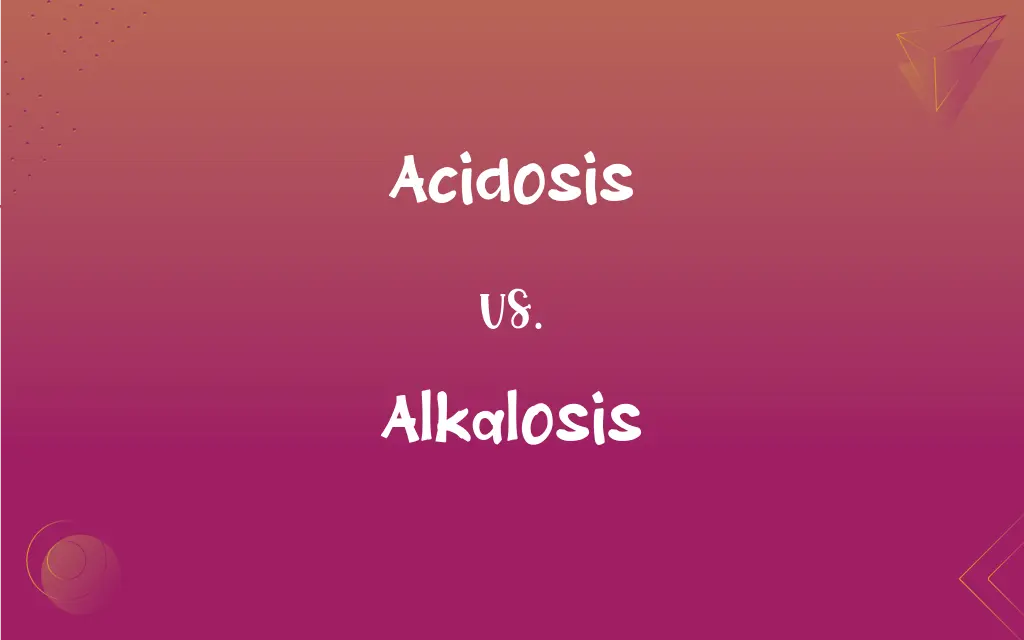Acidosis vs. Alkalosis: What's the Difference?
Edited by Janet White || By Harlon Moss || Published on January 26, 2024
Acidosis is an excess of acid in the blood lowering pH below 7.35, while alkalosis is an excess of base raising pH above 7.45.

Key Differences
Acidosis is a condition characterized by an increase in the acidity of the blood, leading to a pH below 7.35. This can be due to an accumulation of acids or a loss of bicarbonate. Alkalosis, in contrast, is a condition where the blood becomes too alkaline, with a pH above 7.45, often caused by an excess of bicarbonate or a loss of acids.
In acidosis, the body experiences an elevated concentration of hydrogen ions, reducing the blood's pH. This can occur due to respiratory issues (respiratory acidosis) or problems with metabolic functions (metabolic acidosis). Alkalosis, on the other hand, arises when there is a reduction in hydrogen ions or an increase in base components, resulting in a higher pH. This can be classified into respiratory alkalosis, due to decreased carbon dioxide, or metabolic alkalosis, due to increased bicarbonate.
Causes of acidosis vary; metabolic acidosis can result from kidney failure, diabetes, or excessive alcohol consumption, while respiratory acidosis is often due to lung diseases. Alkalosis causes are different; metabolic alkalosis can stem from prolonged vomiting or diuretic use, and respiratory alkalosis may be caused by hyperventilation, often due to anxiety or pain.
Symptoms of acidosis and alkalosis also differ. Acidosis can present with fatigue, confusion, and breathing difficulties. In severe cases, it can lead to shock or death. Alkalosis symptoms include muscle twitching, hand tremor, and light-headedness. Severe alkalosis can cause muscle spasms, convulsions, and even loss of consciousness.
Comparison Chart
PH Level
Below 7.35
Above 7.45
ADVERTISEMENT
Primary Cause
Excess acid or loss of bicarbonate
Excess bicarbonate or loss of acid
Types
Metabolic and Respiratory
Metabolic and Respiratory
Common Causes
Kidney failure, diabetes, lung diseases
Prolonged vomiting, diuretics, hyperventilation
Symptoms
Fatigue, confusion, breathing issues
Muscle twitching, tremor, light-headedness
Acidosis and Alkalosis Definitions
Acidosis
A medical condition characterized by acidic bodily fluids.
Acidosis in diabetic patients can be a sign of uncontrolled blood sugar levels.
ADVERTISEMENT
Alkalosis
An increase in blood pH beyond the normal range.
The patient’s breathing difficulties were attributed to respiratory alkalosis.
Acidosis
An imbalance in the body's pH levels towards acidity.
Acidosis was evident in her symptoms of fatigue and confusion.
Alkalosis
A medical condition marked by a high pH in body fluids.
Alkalosis can cause muscle twitching and confusion, as seen in this case.
Acidosis
A condition of increased blood acidity.
The patient's lab results indicated acidosis, requiring immediate intervention.
Alkalosis
A condition where the blood becomes too alkaline.
Alkalosis was suspected due to her prolonged episodes of vomiting.
Acidosis
A decrease in blood pH due to elevated hydrogen ion concentration.
His respiratory problems led to acidosis, affecting his overall health.
Alkalosis
An abnormal increase in blood bicarbonate levels.
The lab tests confirmed metabolic alkalosis in the patient.
Acidosis
A pathological decrease in the pH of body tissues.
The doctor diagnosed her with metabolic acidosis after evaluating her kidney function.
Alkalosis
A bodily state with excessive base or deficient acid.
His symptoms indicated alkalosis, possibly from excessive antacid use.
Acidosis
Abnormally high acidity of the blood and body tissues caused by a deficiency of bicarbonates or an excess of acids other than carbonic acid. It can result from any of various acute or chronic disorders or from the ingestion of certain drugs and toxins. Also called metabolic acidosis.
Alkalosis
Abnormally high alkalinity of the blood and body tissues caused by an excess of bicarbonates, as from an increase in alkali intake, or by or a deficiency of acids other than carbonic acid, as from vomiting. Also called metabolic alkalosis.
Acidosis
Abnormally high acidity of the blood and body tissues caused by an excess of carbon dioxide due to hypoventilation. Also called respiratory acidosis.
Alkalosis
Abnormally high alkalinity of the blood and body tissues caused by a deficiency of carbon dioxide due to hyperventilation. Also called respiratory alkalosis.
Acidosis
(pathology) An abnormally increased acidity of the blood.
Alkalosis
An abnormally increased alkalinity in the blood.
Acidosis
Abnormally high acidity of the blood and other body fluids.
Alkalosis
Abnormally high alkalinity in the blood and other body fluids.
Acidosis
Abnormally high acidity (excess hydrogen-ion concentration) of the blood and other body tissues
Alkalosis
Abnormally high alkalinity (low hydrogen-ion concentration) of the blood and other body tissues
FAQs
Are there different types of acidosis?
Yes, primarily metabolic acidosis and respiratory acidosis.
How is acidosis treated?
Treatment depends on the cause, ranging from medication to lifestyle changes.
How is alkalosis treated?
Treatment involves addressing the underlying cause and may include electrolyte replacement.
What causes alkalosis?
Common causes include loss of stomach acids, hyperventilation, and diuretic overuse.
What is alkalosis?
Alkalosis is a condition where blood pH rises above 7.45 due to increased alkalinity.
What are the symptoms of acidosis?
Symptoms include fatigue, confusion, shortness of breath, and in severe cases, shock.
What is acidosis?
Acidosis is a condition where blood pH falls below 7.35 due to increased acidity.
What causes acidosis?
Causes include kidney failure, respiratory issues, and metabolic disturbances.
What are the symptoms of alkalosis?
Symptoms include muscle twitching, hand tremors, dizziness, and in severe cases, convulsions.
Are there different types of alkalosis?
Yes, the main types are metabolic alkalosis and respiratory alkalosis.
Is acidosis linked to diabetes?
Yes, diabetic ketoacidosis is a form of acidosis common in uncontrolled diabetes.
Can acidosis and alkalosis be prevented?
Prevention focuses on managing underlying health conditions and maintaining a healthy lifestyle.
Can exercise induce acidosis or alkalosis?
Intense exercise can lead to temporary acidosis due to lactic acid buildup.
Can diet affect acidosis and alkalosis?
Yes, diet can influence body pH, though it's not the sole factor in these conditions.
How quickly can acidosis or alkalosis develop?
These conditions can develop rapidly or over time, depending on the cause.
Is acidosis more common than alkalosis?
Both conditions are common, but their prevalence depends on underlying health factors and environmental conditions.
Can dehydration cause acidosis or alkalosis?
Dehydration can contribute to both conditions, depending on the body's response.
Can stress cause alkalosis?
Yes, stress can lead to hyperventilation, potentially causing respiratory alkalosis.
Is it possible to have a mixed acid-base disorder?
Yes, it's possible to have a combination of acidosis and alkalosis, requiring complex medical evaluation.
Are children at risk of acidosis or alkalosis?
Yes, both conditions can occur in children, often due to underlying medical issues.
About Author
Written by
Harlon MossHarlon is a seasoned quality moderator and accomplished content writer for Difference Wiki. An alumnus of the prestigious University of California, he earned his degree in Computer Science. Leveraging his academic background, Harlon brings a meticulous and informed perspective to his work, ensuring content accuracy and excellence.
Edited by
Janet WhiteJanet White has been an esteemed writer and blogger for Difference Wiki. Holding a Master's degree in Science and Medical Journalism from the prestigious Boston University, she has consistently demonstrated her expertise and passion for her field. When she's not immersed in her work, Janet relishes her time exercising, delving into a good book, and cherishing moments with friends and family.
































































